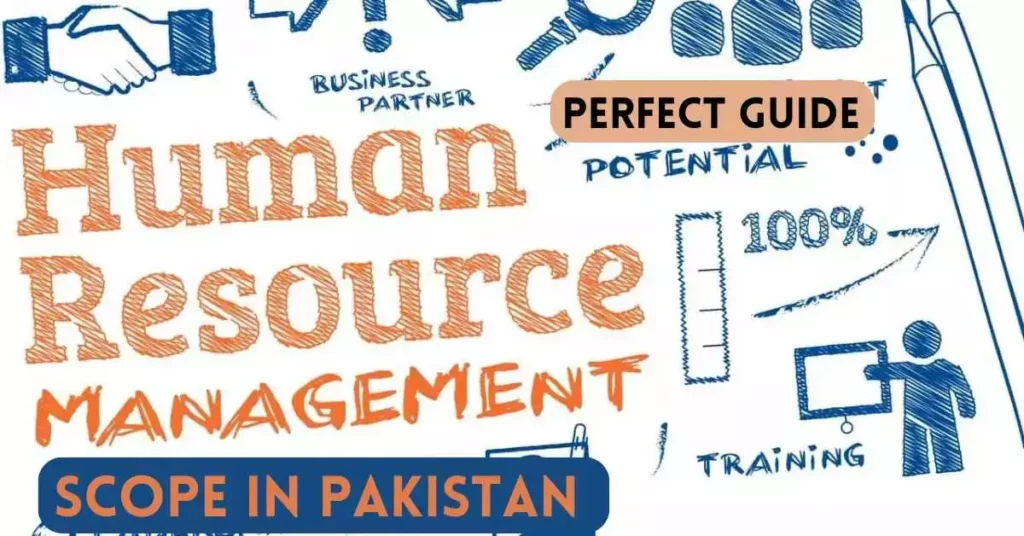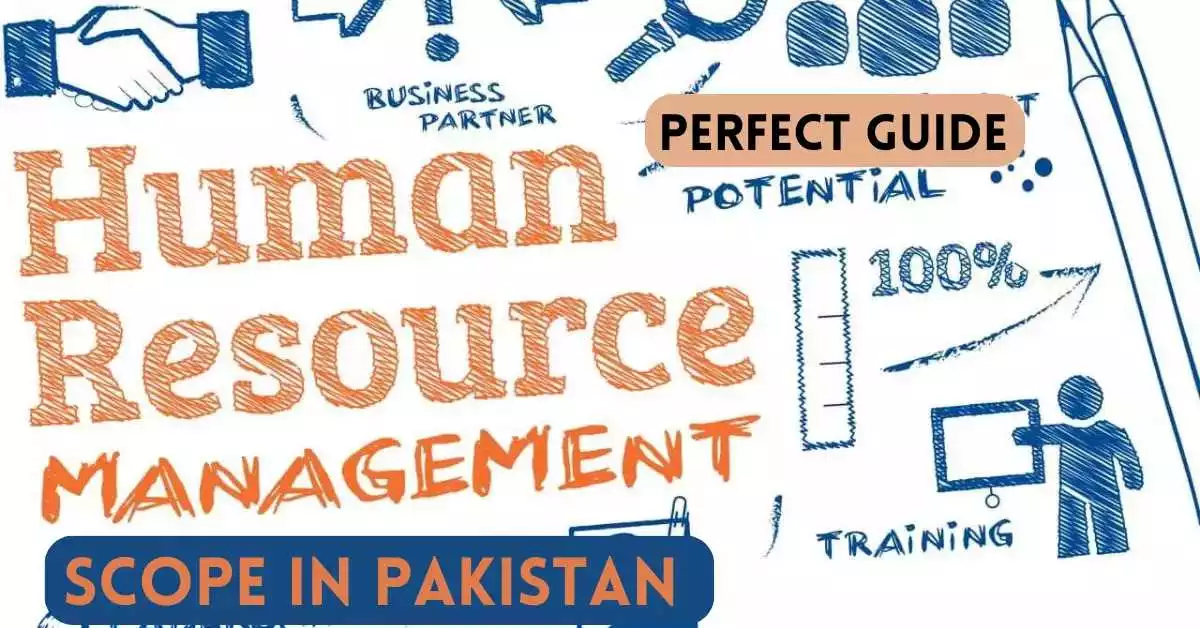Human Resource Management (HRM) in Pakistan offers a gateway to a dynamic career landscape. From the diverse bachelor’s degrees available to the promising career paths, the scope in this field is vast.

This article navigates through the educational avenues, career opportunities, and evolving trends in HRM within Pakistan. Discover the lucrative world of HRM and unleash a spectrum of job possibilities and growth prospects in this vibrant sector.
Understanding HRM Scope in Pakistan
Human Resource Management (HRM) in Pakistan encompasses the strategic approach to managing human capital within organizations. It involves the effective utilization of personnel to achieve organizational goals. HRM functions include recruitment, training, performance management, and employee relations. The scope extends beyond administrative tasks to strategic planning and aligning workforce goals with organizational objectives.
Career Prospects and Job Market
The job market for HRM professionals in Pakistan is robust and continuously evolving. With the increasing focus on talent management, HRM roles have expanded to strategic positions within companies. Job prospects cover various sectors, including manufacturing, IT, education, and banking. Professionals can explore roles as HR officers, consultants, directors, or talent managers, offering a diverse range of career paths.
Salaries and Benefits
Salaries in HRM vary based on experience, education, and job role. Entry-level positions might start at moderate salaries but offer growth opportunities. HRM professionals with extensive experience and expertise can earn competitive salaries, often supplemented with bonuses and benefits such as healthcare, retirement plans, and performance-based incentives. As the role of HRM continues to evolve, compensation packages are becoming increasingly attractive.
Understanding the scope of HRM in Pakistan involves recognizing its breadth of job opportunities, its vital role in organizational strategy, and the competitive yet rewarding compensation it offers. This understanding paves the way for exploring the numerous avenues available in this field.
Career Paths and Specializations in HRM
Specializations within HRM
HRM offers diverse specializations catering to different facets of people management. These include talent acquisition, employee relations, training and development, compensation and benefits, HR analytics, and organizational development. Each specialization demands unique skills and expertise, allowing professionals to delve into areas that align with their interests and strengths.
Job Roles and Responsibilities
Within HRM, various job roles come with distinct responsibilities. HR Officers handle day-to-day HR tasks like recruitment, onboarding, and employee records. HR directors oversee strategic planning and policy implementation.
HR Consultants offer expertise to multiple organizations, while Talent Managers focus on identifying and nurturing talent within companies. Learning and Development Managers focus on enhancing employees’ skills and knowledge. These roles collectively contribute to the efficient functioning of an organization’s workforce.
Exploring the diverse specializations and job roles within HRM provides individuals with a panoramic view of the career paths available. Whether aspiring to oversee strategy or specialize in a particular HR function, these roles offer avenues for professional growth and impact within organizations.
Essential Skills and Requirements
Necessary Skills for HR Managers
Successful HR managers possess a blend of soft and technical skills. Soft skills like communication, interpersonal skills, empathy, and leadership are crucial for effective team management and conflict resolution.
Technical competencies encompass knowledge of labor laws, HR software, data analysis, and strategic planning. Adaptability, decision-making, and problem-solving skills are also vital in navigating the dynamic HR landscape.
Qualifications and Eligibility Criteria
To begin a career, in HRM in Pakistan, it is common to have a bachelor’s degree in Human Resource Management or a related field. However improving your prospects can be achieved by obtaining certifications like SHRM (Society, for Human Resource Management) or HRMP (Human Resource Management Professional). Some positions might require postgraduate education, but experience and demonstrated skills also hold substantial weight in the HRM field.
Understanding the essential skills and qualifications needed to excel in HRM not only aids in career preparedness but also highlights the significance of continuous learning and skill development in this dynamic field.
Read more: Scope of Computational Physics in Pakistan: Perfect Guide
HRM Education in Pakistan
Top Universities Offering HRM Programs
Several reputable universities in Pakistan offer comprehensive HRM programs. Institutions like Allama Iqbal Open University, University Of Karachi, and Virtual University Of Pakistan provide Bachelor’s degrees in HRM with a focus on core HR courses and practical skills development. These programs often cover areas such as recruitment, organizational behavior, HR strategy, labor laws, and employee development.
Admission Criteria and Core Courses
Admission criteria typically include a combination of academic qualifications, entrance tests, and interviews. Core courses in HRM programs encompass subjects like HR planning, compensation management, employee relations, training and development, and strategic HRM. These courses lay the foundation for understanding the intricacies of managing human resources in various organizational settings.
The availability of quality HRM programs in Pakistani universities equips aspiring HR professionals with the knowledge and skills necessary to thrive in this field. Understanding the admission criteria and core course offerings assists individuals in choosing the most suitable educational path for their career aspirations.
Future Trends and Job Opportunities

Trends in HRM in Pakistan
The landscape of HRM in Pakistan is evolving, adapting to technological advancements and changing work dynamics. Trends include the integration of HR technology, emphasizing employee experience, remote work facilitation, diversity, equity, and inclusion initiatives, and the rise of data-driven HR decisions. Embracing these trends becomes imperative for staying competitive in the evolving job market.
Future Job Prospects and Growth
The future of HRM in Pakistan appears promising, with an increasing demand for skilled HR professionals. As organizations prioritize talent management, HR roles will continue to expand, offering opportunities for strategic HR partners and specialists. Roles focusing on HR analytics, change management, and HR transformation are expected to gain prominence, presenting avenues for career growth and innovation.
Understanding the evolving trends and future job prospects in HRM prepares professionals to adapt and equip themselves with the skills and knowledge required to thrive in the dynamic landscape of human resource management in Pakistan.
Job Sectors and HRM Opportunities
HR Careers in Various Sectors
HRM professionals in Pakistan have diverse career opportunities across sectors. In the manufacturing sector, HR professionals oversee workforce management, ensuring efficient operations. The IT sector demands HR specialists for talent acquisition and management due to its dynamic nature. Education sectors rely on HR for faculty management and strategic planning. Banking sectors require HR experts for talent retention and compliance with regulations.
Specific Opportunities in Different Industries
Each sector offers unique HR opportunities. In manufacturing, roles encompass labor relations and safety. In IT, HR professionals focus on attracting tech talent and fostering innovation. Education sectors emphasize learning and development. Banking sectors prioritize talent management and compliance. Understanding these sector-specific opportunities enables HR professionals to tailor their skills and strategies accordingly.
Exploring HRM opportunities across sectors reveals the diverse roles and responsibilities available. Understanding sector-specific demands enables HR professionals to align their expertise with industry needs, opening doors to varied and rewarding career paths in Pakistan.
Read also: BS Entrepreneurship Scope in Pakistan: Salary, Jobs and Career
Functionality and Practices in HRM
Key Functions in HRM
- Planning: HR planning involves forecasting future workforce needs, and aligning with organizational goals.
- Recruitment and Selection: Identifying, attracting, and hiring suitable candidates for roles within the organization.
- Training and Development: Enhancing employee skills and knowledge through training programs.
- Performance Appraisal: Assessing employee performance and providing feedback for improvement.
- Compensation Planning: Designing fair and competitive compensation and benefits packages.
- Employee Relations: Managing relationships between employees and the organization.
- Health and Safety: Maintaining a safe and healthy work environment.
- Industrial Relations: Managing relations between management and labor unions or workers’ associations.
HRM Practices and Operations
In practice, HR professionals strategize to optimize these functions. They implement recruitment strategies using modern tools, conduct performance reviews, design training programs tailored to company needs, and ensure compliance with labor laws. They also establish HR policies that align with organizational goals and foster a positive work culture, promoting employee engagement and productivity.
Understanding the functions and operations within HRM is crucial for HR professionals. It allows them to effectively manage the workforce, align HR strategies with business objectives, and create an environment conducive to employee growth and organizational success in Pakistan.
Challenges and Considerations
Obstacles in HRM Careers
- Changing Work Dynamics: Adapting to remote work, flexible schedules, and changing work environments poses challenges in managing and engaging employees effectively.
- Talent Retention: Retaining skilled employees amid competitive job markets and evolving career expectations.
- Compliance and Regulations: Navigating complex labor laws and ensuring adherence to regulations.
- Technology Integration: Adopting and leveraging HR technology while ensuring data privacy and security.
- Diversity and Inclusion: Promoting diversity and inclusion initiatives in the workplace.
Working Environment and Challenges
HR managers often face high-pressure environments. Balancing the needs of employees with organizational goals, managing conflicts, and mediating disputes require exceptional communication and problem-solving skills. Additionally, ensuring a positive work culture and employee morale amid challenges demands continuous effort and strategic planning.
Recognizing and navigating these challenges in the HRM landscape prepares professionals to proactively address issues and implement strategies that foster growth and development within organizations in Pakistan.
Get more information: Scope of CCNA in Pakistan: Career, Jobs and Saleries
Conclusion: BS Human Resource Management Scope in Pakistan
In the vibrant realm of Human Resource Management in Pakistan, this article has illuminated the multifaceted landscape, outlining the pathways to a dynamic and promising career. From dissecting the intricacies of HRM education to unveiling diverse career trajectories, it has navigated through the depths of this field.
The exploration of trends, prospects, and sector-specific opportunities has showcased the ever-evolving nature of HRM. As the discipline continues to evolve amidst technological advancements and shifting work paradigms, it stands as a testament to adaptability and innovation.
Empowering professionals to embrace change, this comprehensive overview serves as a beacon, guiding aspirants toward a rewarding journey in shaping the workforce and organizational dynamics in Pakistan’s ever-evolving professional landscape.
FAQs:
Human Resource Management (HRM) can be rewarding, involving people skills and organizational development. It’s a good career for those passionate about people.
Yes, HR professionals are often in demand as they play a crucial role in recruiting, managing, and developing talent within organizations.
An HR Executive’s salary in Pakistan can range from around PKR 30,000 to PKR 100,000 per month, depending on experience and organization.
Countries like the USA, the UK, Canada, and Australia offer diverse HR job opportunities due to their robust business environments.
The head of Human Resources is commonly known as the HR Director, HR Manager, or Chief Human Resources Officer (CHRO).
